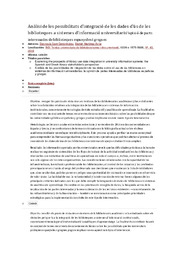| dc.contributor.author | Sant-Geronikolou, Stavroula | en |
| dc.contributor.author | Martínez-Ávila, D. | es |
| dc.date.accessioned | 2020-06-17T05:10:51Z | |
| dc.date.available | 2020-06-17T05:10:51Z | |
| dc.date.issued | 2020 | |
| dc.identifier.issn | 15755886 | |
| dc.identifier.uri | http://hdl.handle.net/10797/26693 | en |
| dc.description | Περιέχει τη περίληψη. | el_GR |
| dc.description.abstract | Objective. To collect the richly textured viewpoints of academic librarians and students on obstacles to library integration in institutional information systems, namely student success technologies and learning analytics. The aim is to contribute with an initial set of recurring themes to baseline knowledge on Spanish and Greek public university libraries' prospects of engaging in this new type of intervention.
Methodology. Interviews were conducted between June and November 2016 in two universities in Spain and Greece and were continuously cross-checked against current literature on the academic climate in an interdisciplinary approach. This process helped to effectively outline a conceptual framework for understanding organisational forces and operational issues that could affect the process of connecting library use data to wider student support systems.
Results. Interviewees' feedback revealed that the practical difficulties involved in systematically tracking in-library student activity workflows and connecting them with campus-wide or even interinstitutional learning analytics initiatives are only some of the operationalisation challenges. Infrastructural capacity-related considerations, the professional development of librarians, user control and strong teacher bias concerns are all high on the stakeholder list of inhibitors that, if they are not tackled, could eventually jeopardize a co-creation and service innovation opportunity of unique value. Easiness of use, voluntariness and feedback were reported among the main criteria with which library data integration in learning analytics systems must comply. A change in data collection practices, the active pursuit of stakeholder engagement and the reconsideration of existing resources, namely infrastructures and funding, were also given as major strategic priorities for the successful implementation of this type of intervention. | en |
| dc.language.iso | spa | en |
| dc.source | Scopus | en |
| dc.source.uri | https://www.scopus.com/record/display.uri?eid=2-s2.0-85084578214&origin=SingleRecordEmailAlert&dgcid=raven_sc_search_en_us_email&txGid=9e6c5344e07068e785f6530579c81f2e | en |
| dc.title | Anàlisi de les possibilitats d'integració de les dades d'ús de les biblioteques a sistemes d'informació universitaris: l'opinió de parts interessades de biblioteques espanyoles i gregues | en |
| dc.type | Article | en |
| dc.subject.uncontrolledterm | Academic libraries | en |
| dc.subject.uncontrolledterm | Educational innovations | en |
| dc.subject.uncontrolledterm | Information systems | en |
| dc.subject.uncontrolledterm | Interviews | en |
| dc.subject.uncontrolledterm | Universities | en |
| dc.subject.JITA | Βιβλιοθήκες ως φυσικές συλλογές, Ακαδημαϊκές βιβλιοθήκες | el_GR |
| dc.subject.JITA | Libraries as physical collections, Academic libraries | en |
| dc.identifier.JITA | DD | en |
